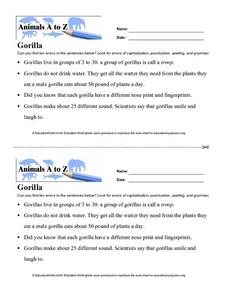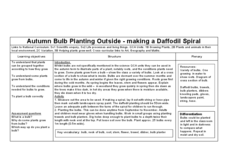Curated OER
Growing Up (And Around, and Down...) Exploring Plant Growth
Students build plant growing structures. In this plant growth lesson, students plant growth structures such as a garden tepee or a crawl through tunnel. They grow plants that are appropriate for the structure.
Curated OER
Life Cycle of Brassica Plants: Planting Seeds
Students explore botany by participating in a calendar class activity. In this plant observation lesson plan, students examine a diagram of a Brassica plant and identify its anatomy before planting their own seeds and viewing the changes...
Curated OER
Animals A to Z: Gorilla
In this editing sentences worksheet, learners read and edit four sentences about gorillas to find the ten errors involving capitalization, punctuation, spelling and/or grammar. Students correct each error.
Curated OER
Hatching Chickens
Students understand the process of how an egg hatches. In this hatching eggs lesson, students care for eggs and chickens while the eggs are hatching. Students observe the hatching process and relate to other animals and humans.
Curated OER
Information Fluency Unit
Third graders pretend they have been asked to make t-shirts to show endangered plants and animals in the rainforest. Using the internet, they research what is happening in the rainforest and discover why the destruction of it is harmful...
Columbus City Schools
Get Your Organisms Organized
From large to small, show your class how to organize them all! Included within the guide is everything you need to take their knowledge of classification from the cellular to the species level. The worksheets focus on building vocabulary...
Curated OER
What Are the Needs of Living Things?
In this living things worksheet, students will write down two facts about what a living thing needs to survive. Using these facts, students will draw a conclusion to how those needs are met.
Curated OER
Animal Signs
Students discuss the many different types of animal signs that can be used to identify and track animals. They participate in an hands-on activity in which they examine tracks, trails, homes, territory markings, and even "scat" left by...
Virginia Department of Education
Photosynthesis and Cellular Respiration
Provide high schoolers with their own indoor gardens! Emerging scientists discuss the process of photosynthesis and germinate seeds before growing plants in multiple lighting conditions. The hands-on application allows pupils to see...
Cal Recycle
Conserving Natural Resources
Trying to plan an engaging elementary science unit on natural resources? Conserve your energy! This five-part series of lessons and hands-on activities has exactly what you need to teach young scholars about the importance of conservation.
Georgia Department of Education
Living Things/ Nonliving Things
How can you tell if something is living or nonliving? Introduce a set of criteria which can be used to determine which things are alive and which are not. The class discusses the basic needs of all living organisms, checks out an...
Curated OER
Autumn Bulb Planting Outside - Making a Daffodil Spiral
Students plant daffodil bulbs. In this gardening activity, students work outside to plant daffodil bulbs in the autumn so that they can grow roots and emerge by spring.
Curated OER
Locating Echo
Students read the book The Adventure of Echo the Bat. For this animal science lesson, students read the book and create a chart labeled "Land Feature," "Habitat," and "Food." Students fill in the table according to where the character...
Curated OER
Awesome Adaptations!
Second graders explore biology by researching animal characteristics. For this adaptation lesson, 2nd graders identify the history of several animals and research the changes that have occurred to their anatomy over thousands of years....
Virginia Department of Education
Weather Patterns and Seasonal Changes
Get your class outside to observe their surroundings with a lesson plan highlighting weather patterns and seasonal changes. First, learners take a weather walk to survey how the weather affects animals, people, plants, and trees during...
National Wildlife Federation
What's Your Habitat?
How are third graders like rabbits? They both live in habitats and require food, water, and shelter to survive! An educational science lesson encourages your learners to think about their own habitats and survival needs, before comparing...
Curated OER
Flutterings and Flowers
Fourth graders investigate the significance of natural resources and the habitats of butterflies. They create a list of their own favorite foods, then watch a video about habitats. Students identify things in the video that animals and...
Curated OER
Photosynthesis and Respiration
Providing an overview of photosynthesis, this presentation would be a quick and easy way to go over information learned in class. This attractive and clear presentation would be a great way to kick off an exploration of photosynthesis.
Curated OER
Exploring Ecosystems
Fourth graders create an ecosystem as a class. They have already produced smaller ones. They use a pond or something similar on school grounds to meet the needs of certain plants and animals of their ecosystem. Specifically created will...
Curated OER
School Site Ecosystem
Fourth graders are introduced to the concept of ecosystem; specifically, the interrelationships among plants and animals within an ecosystem, and their relationships to the environment in which they live and interact.
Curated OER
Food Chains Are Not A Necklace!
Second graders examine how food chains interact with different plants and animals. They practice using new vocabulary. They also discover the role of pesticides in the environment.
Alachua County Public Schools
Food Chain
Two to four players receive seven cards each, with plants, animals, or nitrates depicted. They place what they have onto their own empty game board with the objective to complete a food chain. The game is a fun way to reinforce learning...
Curated OER
Defining Drought
Students examine the hydrologic impacts of drought. They look at drought from a variety of prespectives. Students first focus on the scientific definition of drought, including weather patterns, water cycles, water requirements by plants...
Curated OER
Students Solutions - Saving Our Surroundings
Pupils explore the environmental impact of humans on the plants and animals in their state. In this environmental impact lesson, students use digital cameras to photograph plants and animals in their state. Pupils investigate the animal...

























